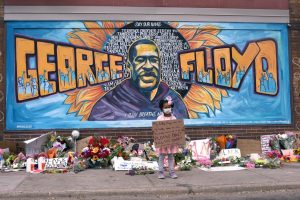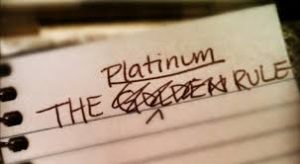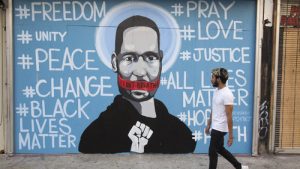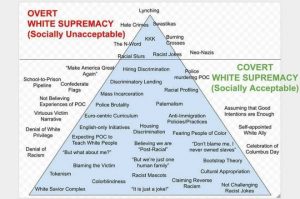‘Let’s get to work.’
June 1, 2020Photo by Xena Goldman
How to Make this Moment the Turning Point for Real Change
by Barack Obama
“As millions of people across the country take to the streets and raise their voices in response to the killing of George Floyd and the ongoing problem of unequal justice, many people have reached out asking how we can sustain momentum to bring about real change.
Ultimately, it’s going to be up to a new generation of activists to shape strategies that best fit the times. But I believe there are some basic lessons to draw from past efforts that are worth remembering.
First, the waves of protests across the country represent a genuine and legitimate frustration over a decades-long failure to reform police practices and the broader criminal justice system in the United States. The overwhelming majority of participants have been peaceful, courageous, responsible, and inspiring. They deserve our respect and support, not condemnation — something that police in cities like Camden and Flint have commendably understood.
On the other hand, the small minority of folks who’ve resorted to violence in various forms, whether out of genuine anger or mere opportunism, are putting innocent people at risk, compounding the destruction of neighborhoods that are often already short on services and investment and detracting from the larger cause. I saw an elderly black woman being interviewed today in tears because the only grocery store in her neighborhood had been trashed. If history is any guide, that store may take years to come back. So let’s not excuse violence, or rationalize it, or participate in it. If we want our criminal justice system, and American society at large, to operate on a higher ethical code, then we have to model that code ourselves.
Second, I’ve heard some suggest that the recurrent problem of racial bias in our criminal justice system proves that only protests and direct action can bring about change, and that voting and participation in electoral politics is a waste of time. I couldn’t disagree more. The point of protest is to raise public awareness, to put a spotlight on injustice, and to make the powers that be uncomfortable; in fact, throughout American history, it’s often only been in response to protests and civil disobedience that the political system has even paid attention to marginalized communities. But eventually, aspirations have to be translated into specific laws and institutional practices— and in a democracy, that only happens when we elect government officials who are responsive to our demands.
Moreover, it’s important for us to understand which levels of government have the biggest impact on our criminal justice system and police practices. When we think about politics, a lot of us focus only on the presidency and the federal government. And yes, we should be fighting to make sure that we have a president, a Congress, a U.S. Justice Department, and a federal judiciary that actually recognize the ongoing, corrosive role that racism plays in our society and want to do something about it. But the elected officials who matter most in reforming police departments and the criminal justice system work at the state and local levels.
It’s mayors and county executives that appoint most police chiefs and negotiate collective bargaining agreements with police unions. It’s district attorneys and state’s attorneys that decide whether or not to investigate and ultimately charge those involved in police misconduct. Those are all elected positions. In some places, police review boards with the power to monitor police conduct are elected as well. Unfortunately, voter turnout in these local races is usually pitifully low, especially among young people — which makes no sense given the direct impact these offices have on social justice issues, not to mention the fact that who wins and who loses those seats is often determined by just a few thousand, or even a few hundred, votes.
So the bottom line is this: if we want to bring about real change, then the choice isn’t between protest and politics. We have to do both. We have to mobilize to raise awareness, and we have to organize and cast our ballots to make sure that we elect candidates who will act on reform.
Finally, the more specific we can make demands for criminal justice and police reform, the harder it will be for elected officials to just offer lip service to the cause and then fall back into business as usual once protests have gone away. The content of that reform agenda will be different for various communities. A big city may need one set of reforms; a rural community may need another. Some agencies will require wholesale rehabilitation; others should make minor improvements. Every law enforcement agency should have clear policies, including an independent body that conducts investigations of alleged misconduct. Tailoring reforms for each community will require local activists and organizations to do their research and educate fellow citizens in their community on what strategies work best.
But as a starting point, here’s a report and toolkit developed by the Leadership Conference on Civil and Human Rights and based on the work of the Task Force on 21st Century Policing that I formed when I was in the White House. And if you’re interested in taking concrete action, we’ve also created a dedicated site at the Obama Foundation to aggregate and direct you to useful resources and organizations who’ve been fighting the good fight at the local and national levels for years.
I recognize that these past few months have been hard and dispiriting — that the fear, sorrow, uncertainty, and hardship of a pandemic have been compounded by tragic reminders that prejudice and inequality still shape so much of American life. But watching the heightened activism of young people in recent weeks, of every race and every station, makes me hopeful. If, going forward, we can channel our justifiable anger into peaceful, sustained, and effective action, then this moment can be a real turning point in our nation’s long journey to live up to our highest ideals.
Let’s get to work.”
Justice & Dignity
…too often in short supply
[From two years ago, even more relevant right now]
You will never regret offering dignity to others.
We rarely get into trouble because we overdo our sense of justice and fairness. Not just us, but where we work, the others we influence. Organizations and governments are nothing but people, and every day we get a chance to become better versions of ourselves.
And yet… in the moments when we think no one is looking, when the stakes are high, we often forget. It’s worth remembering that justice and dignity aren’t only offered on behalf of others.
Offering people the chance to be treated the way we’d like to be treated benefits us too. It goes around.
The false scarcity is this: we believe that shutting out others, keeping them out of our orbit, our country, our competitive space—that this somehow makes things more easier for us.
And this used to be true. When there are 10 jobs for dockworkers, having 30 dockworkers in the hall doesn’t make it better for anyone but the bosses.
But today, value isn’t created by filling a slot, it’s created by connection. By the combinations created by people. By the magic that comes from diversity of opinion, background and motivation. Connection leads to ideas, to solutions, to breakthroughs.
The false scarcity stated as, “I don’t have enough, you can’t have any,” is more truthfully, “together, we can create something better.”
We know it’s the right thing to do. It’s also the smart thing.
-Seth Godin
Stronger than the Golden Rule? Platinum:
Treat others as they wish to be treated.
-dayle
How to be an ally.
FCNL/Quakers
The Friends Committee on National Legislation
FCNL stands with protesters across the country. Advocates are calling for radical change because our institutions, poisoned by a legacy of racial oppression, have failed us. It will require work from every one of us–especially white people–to pave the way to a better future.
And we must make repeated calls for our government and leaders to do better. If you aren’t protesting yourself, hold protesters in the Light and ally yourself with impacted communities. Here are some ways to start:
THINK TWICE BEFORE SHARING VIOLENT VIDEOS
In an article for gal-dem, writer Kemi Alemoru discusses what should be done with videos of police brutality, questioning who these clips are for and whether they actually bring about justice. She writes: “We’re now in 2020, and black people already know about brutality and oppression. It’s this fact that forces the question of whether creating a spectacle out of black death is for black people, who are already familiar with the evils of racism, or whether it is to make white people see the white supremacy they ignore.”
On a platform like Twitter, where videos on your timeline autoplay, users are regularly faced with violent, disturbing footage that could damage their mental health – particularly when it shows someone being murdered. “Sharing violent, explicit, and exhausting images of George Floyd’s brutal death is not healthy for black people to see continually,” poet and activist Kai-Isaiah Jamal wrote on Instagram. “There is so much death, there is so much imagery of death. Please find alternative ways to share this story without the triggering video that is circulating.”
ONFRONT RACISM WHEN YOU SEE IT
In a chart shared by education organisation The Conscious Kid, examples of white supremacy are split into ‘overt’ and ‘covert’. At the top of the pyramid is lynching, hate crimes, and blackface, all of which are categorically unacceptable in society. Further down are examples including calling the police on black people – e.g. this week’s BBQ Becky: Amy Cooper – racial profiling, and ‘All Lives Matter’, which are all still regarded as socially acceptable. In order to change this, and ensure no racism is deemed OK, white people must confront one another about their privilege and enforcement of white supremacy.
As Dazed 100-er Marcelo Gutierrez wrote on Instagram: “To my white followers. It is your responsibility to engage and confront your white family and white friends. Have them question themselves. Hold their inaction accountable. Hold their ignorance accountable. Show them how to take action. Teach them how to begin to change their white community.”
TAKE ACTION
“Do more / something other / than re-sharing images of violence on my timeline challenge,” Travis Alabanza wrote on Twitter yesterday (May 27). Many have criticised the grim trend of simply sharing an image of a black person killed by police, along with a hashtag or empty sentiment, without actually taking action, nor – in the case of white people – addressing the systemic racism that benefits them and kills POCs. Instead, join Black Lives Matter protests – follow your local group on social media to find out when marches are planned – donate to funds that support people of colour, including this one in Minnesota, call your local politician – in the case of Floyd, contact Minneapolis’ mayor Jacob Frey. As Jamal continued on Instagram: “This is not another excuse for you to pretend like you stand with us, whilst filling up our online safe spaces reminding us of our current position in the world and our proximity to danger.”
ACKNOWLEDGE YOUR PRIVILEGE
In a post on Instagram, Munroe Bergdorf urged white people to reflect on their privilege at a time like this, and question how they could use this privilege to make change and educate others in their community. “We need to acknowledge that privilege exists as a spectrum and is an indicator for where the work needs to take place,” the model and activist wrote. “Expecting marginalised folk to be the ones to deconstruct their own oppression is as good as saying “not my problem” and letting it happen, as it doesn’t acknowledge where the problem is coming from. The definition of privilege is thinking that something isn’t a problem because it isn’t YOUR problem.”
PRACTICE SOCIAL DISTANCING
Earlier this month, it emerged that black people are four times as likely to die from coronavirus than white people. Based on this alone, to be a true ally – as gal-dem founder Liv Little rightly pointed out – you must practice social distancing during the pandemic (no matter what example the UK government is setting). As Little wrote on Instagram, accompanied by a chart showing the disproportionately high levels of Black Caribbean COVID-19 deaths: “If you aren’t practicing social distancing, you are truly selfish and there are no polite words to describe how I feel about you.”



